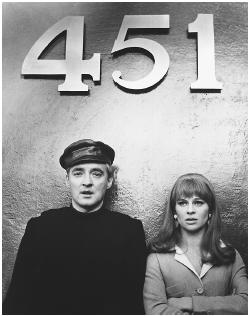Oskar Werner - Actors and Actresses
Nationality: Austrian. Born: Oskar Joseph Bschliessmayer in Vienna, 13 November 1922. Education: Attended Realschule, Vienna. Family: Married 1) the actress Elisabeth Kallina, 1946 (divorced 1950), daughter: Eleanore; 2) Anne Power, 1954 (divorced), one son. Career: 1940—joined the Burgtheater, Vienna; 1941–45—drafted into the German army, but managed to continue acting until 1944, then wounded; 1945—resumed acting career at the Burgtheater: roles in Le Misanthrope , El mayor encanto amor , and Egmont ; also director; 1947—began regular appearances at the Salzburg Festival; 1948—film debut in Der Engel mit der Posaune ; 1951—U.S. film debut in Decision before Dawn ; stage roles in Hamlet in Frankfurt, and Don Carlos , Beckett , and Candida in Vienna; 1959—founded the Theater Ensemble Oskar Werner; 1961—producer and director at the Innsbruck Festival. Awards: Best Actor, New York Film Critics, for Ship of Fools , 1965. Died: In Marburg, Germany, 23 October 1984.
Films as Actor:
- 1948
-
Der Engel mit der Posaune (Hartl)
- 1949
-
Eroica (Kolm-Veltée and Hartl) (as Karl)
- 1950
-
Un Sourire dans la tempête (Chanas)
- 1951
-
Decision before Dawn (Litvak) (as Happy); The Angel with the Trumpet (Bushell); Das gestohlene Jahr (Fross); Ruf aus dem Äther (Klaren); Wunder unserer Tage ( The Wonder Kid ; Wonder Boy ) (Hartl) (as Rudi)

- 1955
-
Der letzte Akt ( Ten Days to Die ; The Last Ten Days ) (Pabst) (as Captain Wuest); Lola Montès (Ophüls) (as the Student); Spionage (Antel); Mozart ( The Life and Loves of Mozart ) (Hartl) (title role)
- 1961
-
Jules et Jim (Truffaut) (as Jules)
- 1965
-
Ship of Fools (Kramer) (as Dr. Schumann); The Spy Who Came In from the Cold (Ritt) (as Fiedler)
- 1966
-
Farenheit 451 (Truffaut) (as Montog)
- 1968
-
Interlude (Billington) (as Stefan Zelter); The Shoes of the Fisherman (Anderson) (as Father David Telemond)
- 1976
-
Voyage of the Damned (Rosenberg) (as Dr. Kreisler)
Publications
By WERNER: article—
"Mistress Cinema," interview in Films and Filming (London), November 1966.
On WERNER: books—
Mazura, Margarethe, Oskar Werner: Maske, Mythos, Mensch , Vienna, 1986.
Dachs, Robert, Oskar Werner: Ein Nachklang , Munich, 1988.
On WERNER: articles—
Current Biography 1966 , New York, 1966.
Obituary in New York Times , 24 October 1984.
"Austrian Stage and Screen Actor Oskar Werner Dies in Germany," in Variety (New York), 31 October 1984.
Obituary in Revue du Cinéma (Paris), January 1985.
Hairapetian, M., "Charmant, besessen, unbestechlich," in Filmwaerts , December 1992.
Stars (Mariembourg), Autumn 1994.
* * *
Oskar Werner once stated that "I don't like films, I only do it for the money. I'm married to the theater, films are only my mistress," so it is not surprising that theater played a considerably larger role in his life than cinema. At 18 he joined the Burgtheater in Vienna, the Austrian equivalent of Britain's Old Vic, and soon made a considerable mark, playing in over 50 productions before being drafted into the army in 1941. After the war he became something of a German stage idol, and also turned his attention to films.
His first major screen role, in Angel with a Trumpet , brought him to the notice of Anatole Litvak, and he was hired by Twentieth Century-Fox to play in Decision before Dawn as a conscience-stricken, anti-Nazi German prisoner of war who volunteers to spy for the Allies behind enemy lines. But, Hollywood had nothing of interest to offer him after this and he returned to Europe. His Hamlet in Frankfurt in 1953 was regarded as one of the great interpretations of the time, and assured Werner a key position in the postwar German theater pantheon. He was sometimes referred to as the Laurence Olivier of the continent, and in 1959 he founded his own theatrical troupe, the Theater Ensemble Oskar Werner.
In 1955 he appeared in, among other films, Ophüls' Lola Montès and Pabst's The Last Ten Days , but it was not until 1961 that he made the first of the films for which he is best known. This was Jules et Jim , which introduced Werner's incredibly boyish good looks and characteristic sense of melancholy to burgeoning "art house" audiences everywhere. Another sensitive, soulful role followed, this time in a Hollywood context, in Stanley Kramer's Ship of Fools , where he played a romantically world-weary doctor opposite Simone Signoret. Perhaps concerned at being typecast in sensitive, troubled parts he then took on the role of a hard-line East German Communist in The Spy Who Came In from the Cold , in which he was surprisingly convincing. The same year, however, he returned both to Truffaut and to another quietly agonised role as a book-burning fireman who has a change of heart in Fahrenheit 451 . (Curiously, Truffaut and Werner died within two days of each other.)
Having achieved the status of an international film star, Werner nevertheless made only a few more films— Interlude , The Shoes of the Fisherman , and Voyage of the Damned —none of them especially interesting or really worthy of his talents. He also appeared in an episode of Columbo . He is reputed to have turned down more than 200 film parts. The increasing rarity of his film (and, for that matter, theater) performances can perhaps partly be ascribed to his frequent quarrels with film and stage directors, and to the fact that in the last ten years of his life, plagued by alcoholism, he lived the life of a virtual recluse.
—Julian Petley